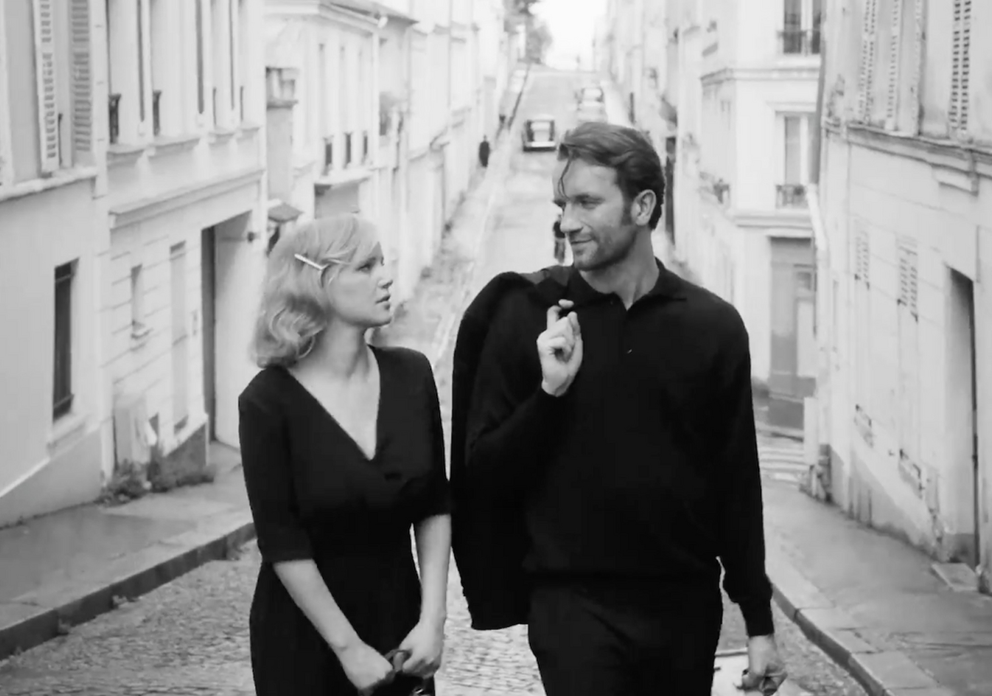Despite being “insignificant” in size, the political importance of Poland during World War II made it a hot little commodity. And, of course, this included the so-called “thaw” of tensions between nations that occurred at the outset of the Cold War, the backdrop of which the eponymously named film from Paweł Pawlikowski finds our unlikely heroes: a music arranger/conductor and a singer. Zuzanna “Zula” Lichoń (Joanna Kulig) is one of the lucky talents selected by Wiktor (Tomasz Kot) and Irena (Agata Kulesza), founders of the Mazurek ensemble, a company that prides itself on scouting only Poland’s most viable musicians and dancers for representing its authentic folk motif. And there is no one more authentic than Zula to embody that, as Wiktor can immediately see upon separating her from the woman she auditions with to hear her vocals isolated and observe that rare, coveted gift in a performer: honest vulnerability.
To further set her apart, Zula chooses as her solo song not a Polish folk ditty, but something she heard from a Russian movie. Indeed, everything about Zula seems to make her stand out from the others, including rumors that she killed her own father. After being accepted into the company and getting one on one time with Wiktor to rehearse, he asks her directly about the lore surrounding her. She quips of the reason she had to harm her father (he’s not actually dead), “He mistook me for my mother, so I used a knife to show him the difference.” So it is that Wiktor’s enchantment is solidified, knowing that he’ll never meet another like her, least of all a girl with such preeminent vocal stylings.
As the company gains more fame and success, the State, as it is usually wont to do when communism is at play, gets involved. They want to spread the talent (along with socialist tenets) further than the confines of Polish villages, and they’re prepared to subsidize it too–so long as the songs performed are in the spirit of promoting the communist propaganda machine. Though Wiktor and Irena are more than hesitant, the director of the ensemble, Lech Kaczmarek (Borys Szyc), is eager to bend over in order to experience the perks of renown. Never mind the fact that Wiktor and Irena’s sole mission for the ensemble was: “No more will the art of the people go to waste.” And yet, this is precisely what happens when the government gets involved, leaving Wiktor and Zula, engaged in a passionate affair by now, thirsting not only for the creativity that would come from a life spent outside of the iron curtain, but one that would also make their relationship less scandalous to the likes of Lech, who himself has it bad for Zula.
As the troupe travels further and further toward Western territory, Wiktor and Irena form a plan to escape to the other side once and for all, where both their love for one another and music can’t be hemmed in by political oppression. But of course, in a scene that harkens back to Nickie (Cary Grant) waiting for Terry (Deborah Kerr) on top of the Empire State Building for hours (ah, things were so much more dramatic when there were no smartphones) in An Affair to Remember, Zula doesn’t show up, setting off a chain of events over the course of the next decade that finds them coming together and tearing apart as a result of the East-West divide. But there is a moment when it seems as though the two might actually get to stay together unmarred when Zula shows up to Paris, explaining to Wiktor that she married an Italian (Sicilian) man in order to cross over to him. And as the two walk the unpopulated (as if) streets of Montmartre, there is a sense of hope that can only come from being at the outset of a dynamic in a new environment. But that newness quickly gives way to Zula’s revelation that the “Westernized” version of Wiktor is not necessarily one she’s so in love with.
Coming to verbal blows with his mistress–a lyricist, of course–at a party, Zula proceeds to drink as only a Polak can, at one point in the night dancing devil-may-care to the bop that was (and remains) Bill Haley’s “Rock Around the Clock,” arguably the apex of signifying Western culture in terms of being a sacrilegious to the values of communism American pop song. And as Zula comes to terms with rather loathing this iteration of the man she thought she knew in Poland, she flees Paris, back to the homeland. Torn up about the loss, Wiktor absconds from the City of Light to prove he can’t live without her despite the extreme risk to his life it will cause as a result of being a man now without origins or country thanks to his long-standing exile.
Before the credits roll, the dedication, “For my parents” adds to the overall twistedness of the third act, but as Pawlikowski explained of his mother and father, “[They are] the most interesting dramatic characters I’ve ever come across…both strong, wonderful people, but as a couple a never-ending disaster.” That is, in the end, what “great love” still amounts to in any narrative, cinematic or otherwise. The old “star-crossed lovers” chestnut continuing to extend well-beyond England to explain the essential tragedy behind any intensely felt love.





















